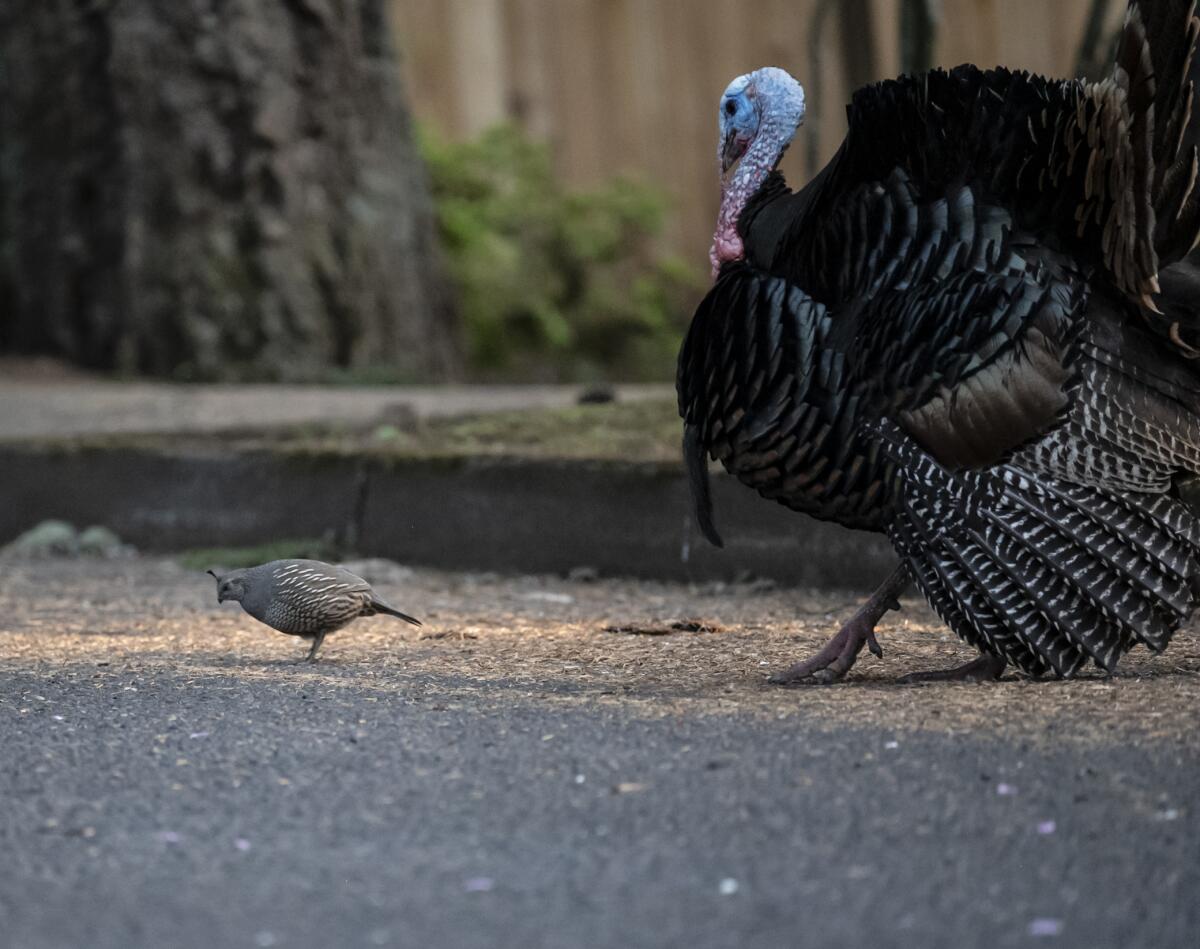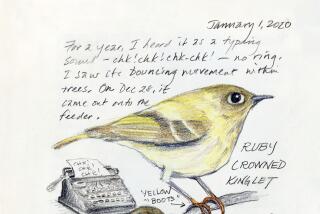Opinion: What a quail taught me about grief by joining a flock of turkeys

- Share via
It’s dusk in spring, and the seven-year anniversary of my mother’s death from cancer is approaching, a death that marked the end of my biological family. I want to text my friend Margot, who lost her dad to AIDS in the spring years ago, and ask, “How do we survive this most heinous of losses? Bestie, how do we keep moving forward?”
And then I look out the window of my little red cottage which sits among Oregon firs and white oaks and see the neighborhood flock of feral turkeys making their way up the street. They’re headed to a hill they use as a runway for their flight into the trees where they roost at night. They’re spectacular: two males in full mating regalia with wings outstretched, wattles gleaming red and blue in the sunset as three drab females step serenely behind. But this evening, I’m transfixed by the bird trailing them — a single quail.
“Jonathan!” I holler to my husband, and he walks out to the porch to confirm the quail. “Is it part of the flock?” I wonder. “And if so, how?”
A string of failures and heartbreaks gave way to the second chances I needed.
As they have every evening for years, each turkey takes a running start, then sails over our heads like pterodactyls, above our neighbors’ Subarus and garbage cans, landing on branches a hundred feet in the air. The quail waits until the last turkey has roosted. Then, without fanfare, he levitates gently up into the oak above him to sleep for the night.
Jonathan and I have seen this quail sitting on rooftops and heard its calls. Birders say the call sounds like “Chi-ca-go! Chi-ca-go!” My husband disagrees. He thinks the quail has been calling, “Over here! Over here!”
“He’s lost his flock,” he concludes.
For years, a covey of quail graced our neighborhood. They lived in the blackberry thicket down the road and roamed our yards in a tiny, burbling gang with topknot feathers bobbing as they snacked on seeds and leaves. But this year, they’re gone.
I realize with sickening sadness that Jonathan’s right — this quail has lost his comrades. For one reason or another they’ve vanished, and he’s been left behind.
I set my alarm for Turkey Roosting Time the next evening, and when it goes off I head outside with my binoculars. On schedule, the flock struts up the street, the males with their flight feathers outstretched, scraping the asphalt dramatically, the females stopping to browse the neighbors’ rhododendrons. The quail runs on his tiny legs to keep up. Again, he waits for the turkeys to roost and then flies into his oak for the night. Now, even more curious, I take to social media.
My dad had epilepsy. To keep from having his driver’s license permanently revoked, he never told his doctor just how often he had seizures.
“What is happening with this quail?” I ask in a regional birding group on Facebook, including a photo. The post receives so many comments that the site awards me a “Top Contributor” badge. Answers run from scientific to hilarious. One man explains that quail and turkeys represent the smaller and larger species in the order Galliformes, which are landfowl that feed on the ground and travel in groups for protection.
Someone else writes, “My interpretation of that photo is that the quail is rich and has hired some muscle-birds for protection against kidnapping. Even a free-range cat would have second thoughts about an ambush.” Good call. My neighborhood is full of free-range cats.
One woman says, “We need a limerick or a haiku to make sense of it.”
Another woman promptly replies:
A lone quail wanders.
In the hills, she spies turkeys.
She’s found her husbands.
I reach out on Instagram to ornithologist James Maley, whom I heard on the science podcast “Ologies.” He explains that quail and turkeys share similar vocalizations and actions. “A friend was just telling me about the same thing happening with a peacock and a flock of turkeys,” he writes of my neighborhood’s phenomenon. “I guess they see each other as friends.”
Driving home the next week with a car full of groceries and a heart full of grief for my dead mom, I spot the turkeys one street over from mine. Without the quail. My heart sinks, and then there he is, trotting out from the English ivy in someone’s frontyard and racing down the hill toward the turkeys just vanishing around the corner.
Now, a whole community’s invested in the well-being of this single quail with enough chutzpah to roll with turkeys 25 times his size. Neighbors compare sightings. I post biweekly updates on Facebook to enthusiastic response.
After I post my latest photo, a member of the birding group comments. “Family. It’s more than blood. He has been adopted.”
Her words make me think of courage, of resiliency — how we always have the option, once our initial mourning is spent, of setting out on our spindly little legs to find a new covey, a substitute for the one that has vanished. It’s not ideal, but it’s something. It might even bring us joy.
I want to perch on my rooftop and yell, “Over here! Over here!” into the void my mother left. Then, maybe, if I’m lucky, a passing flock will find me, offering protection and camaraderie and the inspiration to keep moving forward.
Melissa Hart is the author, most recently, of “Better With Books: 500 Diverse Books to Ignite Empathy and Encourage Self-Acceptance in Tweens and Teens.”
More to Read
A cure for the common opinion
Get thought-provoking perspectives with our weekly newsletter.
You may occasionally receive promotional content from the Los Angeles Times.












